Recherche avancée

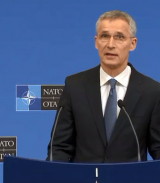 |
L'OTAN en langue de bois
Note IVERIS
10 déc, 2020
L’art de l’esquive, pratiqué à la perfection par Jens Stoltenberg, Secrétaire général de l’Alliance de l’Atlantique Nord, fut déployé dans toute sa splendeur lors d’un entretien accordé début décembre 2020 à Politico. Tous les sujets polémiques y furent passés en revue, sans même l’ombre d’une réponse ou d’une clarification pour aucun d’entre eux. En revanche, on a pu y admirer les principaux éléments de langage auxquels on aura droit dans les prochains mois. Petit dictionnaire du volapük otanien.
|
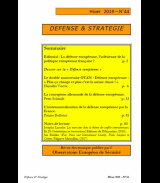 |
Double anniversaire OTAN - défense européenne: « Plus ça change et plus c’est la même chose ! »
Défense & Stratégie n°44, hiver 2019, pp.6-32
30 mars, 2020
Extrait: "Derrière les beaux discours sur « l’autonomie stratégique », la mise en œuvre oppose, comme toujours, le gaullisme résiduel de Paris à l’opinion majoritaire des partenaires qui tiennent à préserver, littéralement à tout prix, la primauté de l’Alliance atlantique. Jusqu’ici rien de nouveau. Sauf que la position française oscille – au pire moment, lorsque tous les événements la confortent pourtant – entre deux approches. Entre « intransigeance sur les principes » et « composer avec le réel », elle espère pouvoir ménager la chèvre et le chou. Autrement dit : avancer vers l’objectif d’émancipation européenne sans trop heurter le tropisme atlantiste-otanien de ses partenaires de l’UE – ce qui équivaut à la quadrature du cercle. Cette démarche a conduit à une extraordinaire confusion dans le discours du président Macron à l’Ecole de Guerre en février 2020, où il a réussi à placer dans un même paragraphe les deux visions antinomiques. D’un côté, il parle de « cette Europe de la défense, ce pilier européen au sein de l’OTAN », de l’autre il met les deux sur un pied d’égalité :« l’OTAN et l’Europe de la défense sont les deux piliers de la sécurité collective européenne » Tôt ou tard, il faudra choisir..."
|
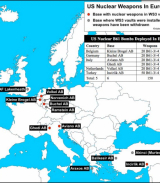 |
Le Parlement belge a failli mettre fin au stationnement des bombes nucléaires US
https://www.iveris.eu/list/documents/481-le_parlement_belge_a_failli_mettre_fin_au_stationnement_des_bombes_nucleaires_us_
22 janv, 2020
Alors que le débat aurait dû être « transparent », comme ce fut prévu après les pseudo-révélations en juillet dernier sur le stationnement de bombes nucléaires américaines en Belgique, le 16 janvier, lors d'un vote final, les députés ont rejeté à une courte majorité de 74 contre 66 toute révision du status quo. Ce vote est passé dans la discrétion la plus totale, aucun journal francophone ne semble avoir repris l’information. Dommage, car à travers cet épisode, c’est un tableau beaucoup plus vaste qui se dessine, avec un faisceau de thèmes qui vont du désarmement universel à la souveraineté démocratique, en passant par le traité de non-prolifération, le marchandage entre alliés, la mise sous tutelle US des Européens, et la servitude à laquelle ils acquiescent, qui plus est sous de faux prétextes. Pour un décryptage du sujet, l'IVERIS vous propose un article publié il y a dix ans, mais qui n’en est pas moins d’actualité, tant les tenants et les aboutissants de cette mascarade nucléaire restent inchangés.
|
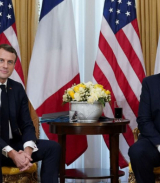 |
Qui a plus « besoin de l’OTAN » ? La France ou… les USA?
IVERIS
12 déc, 2019
Coutumier des déclarations fracassantes mais pas forcément étayées par les faits, le président Trump en a placé deux d’un coup, au dernier sommet de l’Alliance, lors d’une conférence de presse : « Personne n’a besoin de l’OTAN plus que la France (…) Les Etats-Unis en tirent vraiment le moins de bénéfices ». Deux inepties qui méritent que l’on s’y arrête.
|
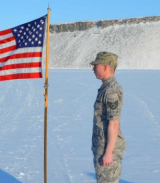 |
Proposition indécente ? Ce que l’idée de Trump d’acheter le Groenland nous dit sur l’OTAN
IVERIS
22 sept, 2019
En jetant son dévolu sur l’île de Groenland, le président Trump a provoqué, comme à l’accoutumée, un mélange de consternation, d’opprobre et de franche rigolade sur la scène internationale. La plupart des commentaires se contentaient de critiquer son style et sa bouderie : il a parlé d’une « grosse transaction immobilière » et, face au refus de vente, il a annulé sa visite prévue et traité les propos du Premier ministre danois de « méchants ». Des observateurs plus avisés ont fait remarquer que l’initiative de Trump est moins fantasque qu’elle n’y paraît au prime abord – elle s’inscrit dans une politique américaine poursuivie de longue date dans la région. Quoi qu’il en soit, pour l’Europe l’essentiel n’est pas là. Il est plutôt dans la mise à nu, pour la énième fois depuis l’arrivée de Trump au pouvoir, d’un raisonnement américain aussi implacable qu’inconfortable.
|
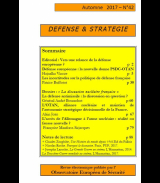 |
Défense européenne : la nouvelle donne PSDC-OTAN
Défense & Stratégie, Automne 2017, n°42, pp. 5-29
05 déc, 2017
Les turbulences dans le ciel européen et transatlantique durant l’année qui vient de s’écouler n’ont évidemment pas été sans incidence sur la cohabitation entre la Politique de sécurité et de défense commune (PSDC) de l’Union Européenne (UE) et l’Alliance atlantique. Les langues se délient, les initiatives se multiplient, de nouvelles perspectives semblent s’ouvrir et provoquent des contrecoups puissants. Quoi qu’il en soit, l’issue va dépendre, une fois de plus, des choix et de la détermination de la France.
|
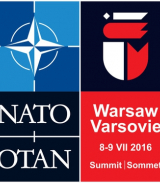 |
Après Varsovie : l’OTAN au sommet de ses contradictions
Défense & Stratégie n°40, automne 2016
19 déc, 2016
Au sommet de l’OTAN à Varsovie, l’objectif affiché était de démontrer, comme le dit le dernier paragraphe du communiqué final, « notre unité, notre solidarité et notre force ». Or sur chacun des trois points, il demeure de sérieux doutes. Qu’il s’agisse de l’unité (faire front commun face aux menaces), de la solidarité (une attaque contre l'un des membres est considérée comme une attaque contre tous) ou de la force (sur ses volets anticipation, décision, action), l’attitude des alliés témoigne de profondes contradictions.
|
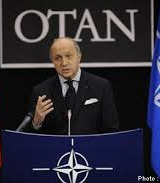 |
Nouveau projet de loi sur l’OTAN : quels risques pour la France ?
Note IVERIS
09 janv, 2016
Au Conseil des ministres du 4 janvier, Laurent Fabius a présenté un projet de loi autorisant l'accession de la France au Protocole sur le statut des quartiers généraux internationaux dans les pays de l’Alliance. Pour rappel : ce Protocole fut signé à Paris, en 1952, avant que le général de Gaulle ne s’en retire en 1966, en déclarant que « la France se propose de recouvrer sur son territoire l’entier exercice de sa souveraineté, actuellement entamée par la présence permanente d’éléments militaires alliés, et de ne plus mettre de forces à la disposition de l’Organisation atlantique ».
|
 |
Suite aux attentats de Paris, l’Europe de la défense renaîtra-t-elle de ses cendres ?
Note IVERIS
18 nov, 2015
En évoquant à Versailles, pour la première fois dans l’histoire, la clause de défense mutuelle de l’UE, le Président François Hollande a donné un coup de fouet formidable à la défense européenne. Au vu de l’extraordinaire emprise des Etats-Unis et de l’OTAN sur la sécurité en Europe, il s’agit d’un véritable coup de force. Dans la foulée, la Haute Représentante de l’Union européenne lui a emboîté le pas sans hésiter.
|
 |
Les USA vont-ils pouvoir engager les troupes de l’OTAN ?
Note IVERIS
10 nov, 2015
Peu évoqué en public, l’un des dossiers les plus déterminants pour l’avenir de l’OTAN concerne la proposition américaine qui souhaiterait que le Commandant suprême US soit investi de l’autorité de déployer, de son propre chef, les troupes de l’Alliance. A la conférence de Riga, cette question d’habitude présentée de façon délibérément ambiguë, a donné lieu à des clarifications édifiantes.
|
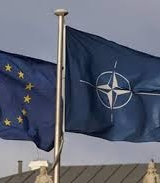 |
UE-OTAN, la petite différence
Note IVERIS
07 nov, 2015
Patrick Keller, coordinateur pour la politique étrangère et de sécurité de la Fondation Adenauer, oppose d’une part la vitesse à laquelle l’OTAN s’est adaptée à la nouvelle donne sécuritaire issue de la crise en Ukraine, d’autre part l’inertie de l’UE qui, elle, ne s’y est toujours pas adaptée. Un constat qui mérite que l’on s’y arrête.
|
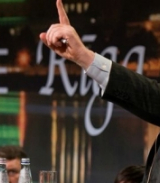 |
Une OTAN très combative à la Conférence de Riga
Note IVERIS
07 nov, 2015
Le premier panel de discussion de la Conférence de Riga, intitulé « L’OTAN défenseur de la stabilité globale », n’a laissé aucun doute sur les préférences des participants. Que ce soit un général britannique ancien Commandant suprême adjoint de l’Alliance, le M. Sécurité de la Fondation Adenauer en Allemagne, un ancien ambassadeur américain à l’OTAN, ou le Secrétaire d’Etat du ministère de la Défense de la Lettonie, ils sont tous pour une approche dure vis-à-vis de la Russie. Leur unique réserve par rapport à la politique actuelle des Etats-Unis et de l'OTAN est qu’elle ne s’affirme pas avec une fermeté suffisante.
|
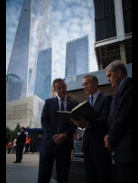 |
L’OTAN reçoit un souvenir des Tours jumelles
Note IVERIS
28 sept, 2015
En déplacement sur la côte Est des Etats-Unis, le Secrétaire général de l’OTAN n’a pas manqué de rendre hommage aux victimes et aux survivants du 11 septembre. Et il n’est pas parti les mains vides.
|
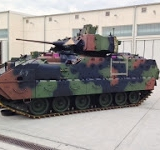 |
Les chars US en Europe vont être repeints en camouflage « forêt »
Note IVERIS
04 sept, 2015
Jusqu’ici en couleur « désert », en raison des opérations au Moyen Orient, les chars et autres véhicules blindés américains stationnés en Europe vont être repeints en vert « forêt » dans les prochaines semaines. Pour le commandant de l’armée de terre US, « la peinture prend, soudainement, de l’importance » dans le contexte actuel. Autrement dit, ce nouveau camouflage est comme le symbole de la détermination des Etats-Unis à s’engager face à la Russie, jusque sur le terrain, pour défendre leurs alliés est-européens.
|
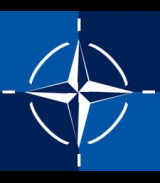 |
L’OTAN cherche à contourner la règle du consensus
Note IVERIS
25 aout, 2015
Le jour s’approche-t-il où l’Amérique pourra, de son seul fait, entraîner l’ensemble de l’OTAN dans une guerre ? La question n’est hélas pas aussi surréelle qu’elle n’y paraît. A la réunion ministérielle de l’Alliance, fin juin, le SACEUR (commandant suprême) « a reçu l’autorité d’alerter, de mobiliser et de préparer les troupes » de son propre chef, en attendant le feu vert du Conseil pour le déploiement sur le terrain. Mais soyons réalistes : les troupes déjà sur le tarmac, les avions prêts à décoller, les tambours battants – difficile d'imaginer comment un Etat membre réticent oserait, à ce stade, monter au créneau pour arrêter la machine de guerre de l’Alliance.
|
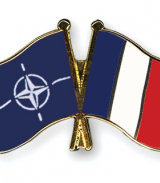 |
La France, toujours plus intégrée dans l'OTAN
Note IVERIS
02 juil, 2015
« Depuis le 10 juin, l’espace aérien français a été inclus dans le Système de défense aérienne et antimissile intégrée de l’OTAN, dispositif essentiel de la politique de défense aérienne et antimissile de l’OTAN et pierre angulaire de la défense collective de l’Alliance. »
|
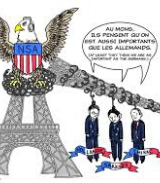 |
A la réunion de l’OTAN, bon courage pour parler de renseignement
Notes d’actualité, 24 juin, 2015
L’ambiance n'est pas assurée, pour la réunion ministérielle de l’Alliance atlantique aujourd'hui. Le moins que l’on puisse dire, c’est que la démonstration prévue de la parfaite unité transatlantique est quelque peu entachée par les toutes récentes révélations de Wikileaks sur l’espionnage américain contre trois présidents de la République successifs. L’actuel chef de l’Etat y compris.
|
 |
La « guerre hybride » tombe à pic
Notes d’actualité, 18 mars, 2015
La dernière Lettre de la Représentation militaire de la France à l’UE aborde le concept de la « guerre hybride » (très en vogue à la suite de la crise russo-ukrainienne, comme si on venait de découvrir qu'une guerre se conduit sous des formes multiples, dans des dimensions à la fois militaires et civiles). La conclusion que l’on en tire est édifiante à plus d'un titre.
|
 |
Armes létales et « unité occidentale »
Notes d’actualité, 04 févr, 2015
Armer ou ne pas armer l’Ukraine ? Telle est la question suspendue comme une épée de Damoclès au-dessus de la tête des ministres de la défense de l’OTAN qui se retrouveront demain 5 février pour discuter de leur fameux « plan de réactivité ». Les uns et les autres ont commencé à poser leurs jalons à la veille de la réunion. Or il est impossible d’ignorer le potentiel de désordre, au sein du soi-disant Occident, que comporte cette interrogation sur d'éventuelles livraisons.
|
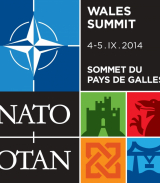 |
L'Alliance atlantique face à la crise ukrainienne (Bilan du sommet de l OTAN au pays de Galles)
Défense & Stratégie n°36, automne 2014
13 nov, 2014
Quelques extraits de l’article « L’Alliance atlantique face à la crise ukrainienne : la réatlantisation de l’Europe (Blian du sommet de l'OTAN au pays de Galles) », qui vient de paraître dans la Revue Défense & Stratégie.
« D’après le discours officiel, le sommet de 2014 de l’Alliance aurait « largement changé d’orientation » à la suite de la crise russo-ukrainienne. En réalité, chacune des supposées nouvelles orientations, chacun des soi-disant changements (tous liés, d’une manière ou d’une autre, au retour en force de la défense collective à travers l’article 5) n’est que la reprise de thèmes et la réaffirmation de priorités qui avaient été prévus depuis longtemps. »
|
 |
Un pour tous, tous pour un ? (Partie 2 : interrogations dans l'Alliance)
Notes d’actualité, 29 oct, 2014
Au dernier sommet de l'OTAN, la défense collective a fait un « comeback » fracassant, la crise russo-ukrainienne aidant. Certes, ce fut déjà inscrit au programme depuis deux ou trois ans. Avec la baisse sensible de l’appétit pour les exploits extérieurs (peu populaires, trop coûteux, entraînant des résultats politiques pour le moins douteux), et la nécessité de rassurer les nouveaux alliés, particulièrement angoissés après l’annonce du « pivot » américain, l’Alliance devait, de toute façon, dépoussiérer son article 5. Ce qu’elle était en train de faire. Mais rien ne vaut un petit affrontement bien pimpant avec la Russie, pour donner un coup de pouce en la matière.
|
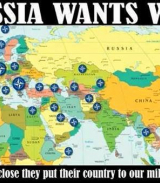 |
OTAN/US : bases permanentes à l’Est ?
Notes d’actualité, 31 mai, 2014
Le ministre polonais des Affaires étrangères n’y va pas par quatre chemins. Dans un récent article du Spiegel allemand, sur l’insuffisante préparation de l’Alliance face à une hypothétique invasion russe, Radek Sikorski fait remarquer : « Il y a des bases au Royaume-Uni, en Espagne, en Allemagne, en Italie et en Turquie. Mais il n’y a aucune base là où on en a besoin ». En avant donc, pour des bases permanentes en Pologne et dans les Etats baltes. Après tout, quoi de mieux pour promouvoir la désescalade?
|
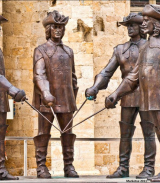 |
Un pour tous, tous pour un ? (Partie 1 : l’OTAN et ses garanties en trompe-l’œil)
Notes d’actualité, 13 mai, 2014
Conséquence immédiate de la crise en Ukraine : la « défense collective » a le vent en poupe. L’un des mythes les plus soigneusement entretenus des relations transatlantiques et, par là même, l’un des tabous les plus persistants de la défense européenne, le concept d’assistance militaire mutuelle a été propulsé sur le devant de la scène. Il serait donc temps de le regarder d’un peu plus près.
|
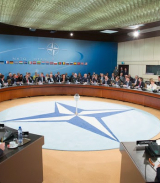 |
Premières fissures dans la façade « occidentale »
Brèves, 29 avril, 2014
Certes, c'est le temps des propos grandiloquents sur l’unité de l’Occident. Certes, c’est aussi le temps des gestes rassurants entre membres de l’OTAN. Mais plus la crise ukrainienne dure, plus les alliés doivent se rendre compte que leur détermination n’est que du spectacle, au fond. Après avoir poussé ses amis européens vers la radicalisation et encouragé l’escalade, le président Obama a clairement fait savoir qu’il n’avait d’ailleurs nullement l’intention de faire intervenir ses soldats. Ce qui est fort sage. Mais laisse quand même la porte ouverte à une (très hypothétique) « pire des scénarii », dans lequel les Européens se retrouveraient seuls face à une Russie provoquée à outrance par les Etats-Unis.
|
 |
En une minute : l’impact de la crise ukrainienne sur l’OTAN
Brèves, 25 avril, 2014
L’Alliance joue quitte ou double sur le dossier russo-ukrainien. Soit elle réussit à paraître super-crédible ; dans ce cas, elle se retrouverait renforcée, pour ne pas dire bétonnée à tout jamais (et nous pourrions faire nos adieux à la défense européenne). Soit, c’est l’effet « l’heure de vérité » qui l’emporte (par la mise en évidence du caractère fictif des soi-disant garanties face à une crise réelle) ; ce qui viderait l’Alliance de sa substance et la précipiterait dans un état végétatif, sous respiration artificielle.
|
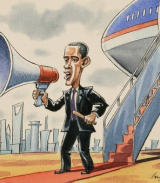 |
Obama sur la corde raide, entre l'Europe et l'Asie
Notes d’actualité, 24 avril, 2014
C’est un vrai numéro d’équilibriste que le président Obama tente de réussir entre ses alliés en Europe d’un côté, et ceux en Asie de l’autre. Le voilà donc en pleine crise ukrainienne, parti faire une tournée pour rassurer ses partenaires asiatiques que le pivot vers eux existe bel et bien - le contraire du message que l’administration US s’efforce d'envoyer à ses alliés européens.
|
 |
Petites perles de la semaine écoulée – compilation des entrées Google+ (13 avril 2014)
Brèves, 13 avril, 2014
Géopolitique
Dans le prochain numéro de Time, Robert D. Kaplan parle de « la revanche de la géographie ». Notamment en faisant le constat que « La géographie n’a pas disparu. L’élite globalisée – les universitaires, intellectuels, analystes des relations internationales, les patrons de fondations et les puissants du monde des affaires, de même que beaucoup de dirigeants occidentaux – ont pu largement l’avoir oubliée. Mais ce à quoi nous assistons aujourd’hui, c’est la revanche de la géographie ».
|
 |
La Russie aurait-elle vraiment mal calculé ?
Brèves, 05 avril, 2014
Au vu de l’OTAN revivifiée, sous prétexte d’un nouveau « clear and present » danger, la question se pose inévitablement: le président Poutine se serait-il tiré une balle dans le pied ? Certainement pas. Quoi que l'on puisse penser du reste, il est difficile de croire que le pouvoir russe n’ait pas prévu la réaction de l’Alliance. C’était plus que prévisible – c’était évident. Pourquoi Moscou a donc pris le risque d’aller de l’avant avec un plan qui promettait, dès le départ, non seulement d'antagoniser mais aussi de ressouder l’Occident ?
|
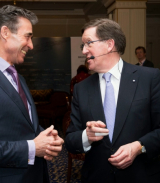 |
Crise en Crimée : l’OTAN saute sur l’opportunité
Notes d’actualité, 24 mars, 2014
Le Secrétaire général de l’Alliance atlantique a du mal à cacher son soulagement. Enfin, à la dernière minute, voici tombée du ciel la raison d’être tant recherchée pour l’OTAN post-Afghanistan. Face à l’ogre russe, vite, il faut se ranger en ordre de bataille. Peu importe si ça fait un peu réchauffé. L’essentiel, c’est que la crise en Ukraine devrait nous aider à en finir, une fois pour toutes, avec les hésitations et les états d’âme qui menaçaient, ces derniers temps, de remettre sérieusement en question l’avenir de « l’Alliance la plus réussie de l’Histoire ».
|
 |
Le droit des peuples à disposer d’eux-mêmes - une version particulière, taillée sur l’Ukraine
Brèves, 04 mars, 2014
Le « message fort » que le Secrétaire d’Etat Kerry entend faire passer lors de sa visite à Kiev, c’est que les Etats-Unis soutiennent « le peuple de l’Ukraine et la voix du peuple ukrainien ». Or son homologue russe eut beau jeu de brocarder (à la Conférence sur la sécurité à Munich en février), l’interprétation occidentale du droit des peuples à disposer d’eux-mêmes dans le cas de l'Ukraine. M. Lavrov faisait remarquer que « Le Secrétaire général de l'OTAN et mon ami, Anders Fogh Rasmussen, a également parlé de la nécessité de donner à l'Ukraine la liberté de choix. Cependant, nous nous souvenons tous comment en 2007, lors du sommet de l'OTAN ce choix de l’Ukraine a été politiquement préétabli. «
|
 |
Crise ukrainienne : petite mise au point préalable
Notes d’actualité, 03 mars, 2014
C'est ce qui s'appelle un timing parfait. Une mission d’information de l’Assemblée nationale vient de présenter les résultats de ses travaux au sujet de « la politique française et européenne vis-à-vis de la Russie ». Voici quelques extraits relatifs à l’Ukraine, tirés du Rapport d’information, et de l’audition des auteurs (Chantal Guittet et Thierry Mariani) qui s’en est suivie. En y ajoutant, sans surprise, une petite touche transatlantique.
|
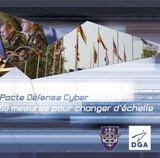 |
Pacte Défense Cyber : gare aux alliances !
Theatrum Belli
02 mars, 2014
Le Ministère de la défense a présenté récemment son « Pacte Défense Cyber », un plan d’action en 50 points pour cadrer ses actions en matière de cyberdéfense. Jusqu’ici, rien de plus normal, il s’agit évidemment d’un enjeu d’importance cruciale. Toutefois, ce qui retient immédiatement l’attention, c’est la tension (voire contradiction) entre d’une part l’impératif de souveraineté dans ce domaine hautement stratégique et, de l’autre, l’insistance du Pacte sur des cadres de coopération internationale où, c’est le moins que l’on puisse dire, les partenaires de la France ne partagent pas forcément ce souci.
|
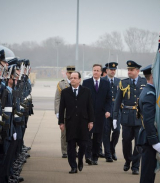 |
L’Europe de la défense, éternelle pomme de la discorde entre la France et le Royaume-Uni
Notes d’actualité, 31 janv, 2014
Au récent sommet franco-britannique, en plein milieu des annonces concernant la coopération militaire bilatérale, le président Hollande a frôlé le crime de lèse-majesté, en osant prétendre que « Le drone de combat préfigure ce que pourrait être une Europe de la défense ». Pour les Britanniques, coopérer, pourquoi pas, mais n'évoquons surtout pas l'Europe, et en particulier pas en l'associant aux questions de défense.
|
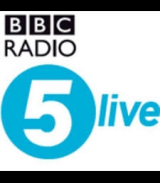 |
Une Ecosse indépendante non-nucléaire dans l’OTAN ?
Entretien à BBC Radio l’émission 5 Live Drive
20 nov, 2013
En quoi la posture antinucléaire du SNP (Scottish National Party) devrait-elle constituer un problème pour une Ecosse indépendante mais soucieuse de garder sa carte de membre à l’OTAN ?* En pas grand-chose, pour faire bref. Le fait d’exiger le retrait des armes nucléaires UK de son territoire et de se proclamer Etat non nucléaire n’est pas a priori en contradiction avec le statut de membre de l’OTAN. Pour rappel : à présent 20 pays membres sur les 28 ne possèdent ni n’hébergent d’armes atomiques sur leur sol.
|
 |
Petites perles de la semaine écoulée (3 novembre 2013) - compilation des entrées Google+
Brèves, 03 nov, 2013
NSA/Europe
1. Berlin, nid d’espions US. Visiblement, la Chancelière devient susceptible quand on touche à son portable. Pour rappel : jusqu’à la nouvelle que son « instrument de puissance » favori pourrait être surveillé par la NSA, Mme Merkel avait fait profil bas. Elle ne s’était pas offusquée outre mesure en apprenant cet été que ses compatriotes furent massivement écoutés par les services US, ni ne s’était montrée vraiment compatissante quand son partenaire français s’offusquait il y a une semaine. Mais tout ça, c’était avant l’affaire du portable. Depuis, elle n’arrête pas de s’indigner à tout va. Compte tenu des dernières précisions, elle aura encore de quoi.
|
 |
L’OTAN à la manœuvre
Brèves, 07 oct, 2013
L’intensification et le focus européen du programme d’exercices de l’Alliance confirment ce que les conseillers OTAN répètent depuis déjà un bon bout de temps : il faut renouer avec les grands exercices annuels de la guerre froide, pour recréer une sorte de « Reforger Lite »*. C’est bon pour le moral et bon pour les armes. D'une part, en rassurant les nouveaux Etats membres, inquiets de voir l’Amérique 'pivoter' vers l’Asie, que le soi-disant parapluie est toujours en place. De l’autre, en faisant avancer la sacro-sainte interopérabilité, entendue comme alignement, autant que faire se peut, des concepts européens sur les doctrines et standards US guidés par l’obsession de la guerre technologique.
|
 |
Forces navales des pays de l’OTAN: les pièges de la dépendance
Brèves, 26 sept, 2013
Une récente analyse sur les capacités maritimes des pays de l’OTAN met le doigt sur le fait qu’au moment même où l’Amérique se réoriente vers l’Asie, la dépendance des Européens par rapport aux Etats-Unis en matière de forces navales ne cesse de grandir. C'est vrai. Mais deux petites remarques s’imposent à ce sujet. Si les flottes européennes se réduisent comme une peau de chagrin, c’est aussi parce que les budgets (déjà en baisse) sont phagocytés par notre participation/soumission au système militaro-industriel américain. Soit par choix (contributions aux programmes JSF et bouclier antimissile, achats sur étagère), soit ensuite par obligation (une fois acheté, l’entretien et la modernisation du matériel US se fait au moment et au coût dicté par le Pentagone, selon la logique des « block upgrades »), les décideurs européens se retrouvent contraints de sacrifier leurs autres capacités.
|
 |
Lectures de la semaine (25 août 2013)
Brèves, 25 aout, 2013
Les fidèles Britanniques ont eu droit à un énième camouflet de la part de leurs « cousins » d’outre-Atlantique, cette fois-ci sous la forme d’une petite pique du porte-parole de la Maison Blanche qui a publiquement pris ses distances avec les autorités du Royaume-Uni. En affirmant, sans rire, à propos de la destruction des disques durs du journal Guardian contenant les fuites sur les programmes de surveillance UK-US (Tempora/PRISM), qu’il « est difficile d’imaginer un scénario dans lequel ce serait approprié ».
|
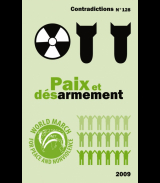 |
Parapluie ou hara-kiri ? – la présence nucléaire américaine en Europe
Contradictions n°128 (Paix et désarmement)
09 oct, 2009
Bien trop souvent, on est tenté d’assimiler la présence nucléaire américaine en Europe à sa seule dimension tangible. A savoir le stationnement de quelques centaines de bombes US sur le sol de cinq pays du continent européen, dans le cadre de l’OTAN et de son soi-disant « partage nucléaire ». Et on a tort de le faire.
|
 |
Le « retour » de la France dans l'OTAN : fausses raisons et vraies conséquences
La Lettre Sentinel n°51, avril 2009
08 avril, 2009
Saluée (ou vilipendée, c’est selon) comme un « retour au bercail », la réintégration des structures militaires intégrées par la France finira-t-elle par faire exploser l’Alliance ? La question n’est paradoxale que d’apparence. A contre-courant des évolutions géopolitiques, basée sur un argumentaire dont la vacuité se manifestera au grand jour avant même qu’on n’ait commencé à changer les enseignes des bureaux et réimprimé les cartes de visite, cette décision (formellement pas encore prise) est surtout perçue et interprétée de manière diamétralement opposée par les protagonistes. D’où les attentes contradictoires, pour ne pas dire incompatibles, des deux côtés.
|
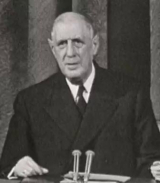 |
Le Général face à l OTAN: une analyse toujours actuelle
La Lettre Sentinel n°51, avril 2009
01 avril, 2009
Une des formules récurrentes dans les discussions sur le plein retour de la France à l’OTAN, quoique admise de tous côtés comme une évidence, mérite néanmoins que l’on s’y arrête un instant. Il s’agit du contexte géostratégique qui aurait subi, paraît-il, d’énormes changements. De prime abord, c’est un truisme: l’URSS a disparu, la guerre froide est terminée, l’Europe de la Défense créée – si bien que le Général de Gaulle et ses chamailleries avec l’OTAN semblent résolument appartenir au passé. En réalité, aucune des mutations, certes indiscutables, de ces quarante dernières années n’est de nature à remettre en question le bien-fondé de la décision de 1966. A y regarder de plus près, on dirait plutôt qu’elles le confirment.
|
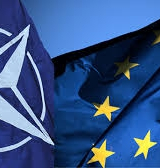 |
Le syndrome UE-OTAN: coup de projecteur sur les réalités transatlantiques
Journal of Contemporary European Research Vol3 I2
21 sept, 2007
Contrairement aux deux courants dominants, quoique diamétralement opposés, des pronostics qui furent très à la mode il y a quelques années, il apparaît de plus en plus clairement que les casse-tête liés à la problématique UE-OTAN sont appelés à durer. Ceux qui, au vu des difficultés initiales à établir des relations mutuellement acceptables entre les deux organisations, parlaient de « maladies de jeunesse » susceptibles de céder la place, avec le temps, à une insertion harmonieuse du nouveau-né « PESD » (politique européenne de sécurité et de défense) dans le système atlantique, ont eu tout aussi tort que ceux qui y voyait encore une nouvelle occasion pour sonner le glas de l’Alliance atlantique. Hélas, pour l’heure et dans un avenir prévisible, aucun des deux scénarios ne semble près de se réaliser.
|
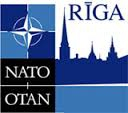 |
Champs de bataille otaniens après le sommet de Riga
La Lettre Sentinel n°43-44, janvier-février 2007
09 févr, 2007
Le sommet de Riga de l’OTAN, fin novembre dernier, fut l’exemple type du non-événement spectaculaire. Frappant surtout par le contraste entre les attentes aiguisées par la publicité faite à la rencontre des 26 chefs d’Etats et de gouvernement d’une part, et le bilan piteux de la réunion de l’autre. Les effets d’annonce prévus pour l’occasion avaient peu à peu laissé la place à la réalité envahissante que constitue la déplorable situation des alliés en Afghanistan. Celle-ci n’étant, par ailleurs, que l’un des (très) nombreux symptômes du malaise grandissant au sein de l’Alliance.
|
 |
Brèves transatlantiques de décembre 2006
La Lettre Sentinel n°43-44, janvier-février 2007
08 févr, 2007
Quelques nouvelles de l’actualité européenne et transatlantique, brièvement présentées et commentées.
|
 |
Les relations UE-OTAN: entre coopération nécessaire, compétition inhérente et l’inéluctable changement de paradigme
Az Észak-atlanti Szerződés Szervezete a változás korában
15 aout, 2005
Les relations UE-OTAN ne sont qu’un symptôme. Elles reflètent d’un côté l’épreuve de force entre les deux rives de l’Atlantique et, de l’autre, la schizophrénie intra-européenne. Au centre de ce bras de fer complexe, il y a une seule question cruciale et un seul véritable enjeu : l’autonomie européenne. Pour ce qui est du prétendu choix à faire entre coopération ou compétition UE-OTAN, c’est un faux dilemme. Dans l’état actuel des rapports de force, les deux sont inévitables.
|
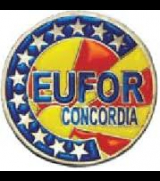 |
Au-delà du symbolisme : la première opération militaire de l'UE vue dans son contexte
Die Deutsche Gesellschaft für Auswärtige Politik
01 juil, 2003
A casual observer of Concordia – code-name for the European Union’s first-ever military operation, conducted in Macedonia – would be first impressed by the abundance of symbols in almost every aspect of the mission. Not only do the politicians’ declarations put the emphasis on the „symbolic European message” carried by the operation[1] or present it as a „significant step forward in the long process of European integration”[2], but also the EU seems determined to plant its blue flag all over the place in order to increase its visibility – a goal explicitly identified as one of the key objectives of the mission.[3]
|
 |
En marge d un anniversaire… (dix ans après la dissolution du Pacte de Varsovie)
Journal Francophone de Budapest
01 juil, 2001
Lorsque le 1er juillet 1991, les pays membres du Pacte de Varsovie - à la fois symbole et instrument concret de l'emprise soviétique sur l'Europe centrale et orientale - signent la dissolution officielle del'organisation, ils mettent le point final à un mouvement de désintégration devenu inéluctable.
|
|
 |
Les plus lus

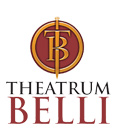
|



